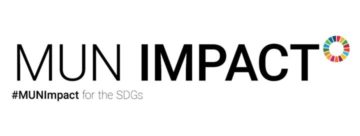Many MUN delegates dream of working at the UN and that is one reason why Mr. Brenden Varma’s session was a popular segment of the Global Summit’s line-up. Following a presentation to MUN Impact’s MUN@Home program a few weeks ago, over 70 participants joined Mr Varma to hear his experiences from working at the UN for 18 years. His presentation not only told his story, but his work to bridge the gap between MUN delegates and the real United Nations.

Brenden’s UN journey started when he received a magazine in his high school in Pennsylvania, the cover of which depicted the collaboration and constructive debate that occurs within the UN. This inspired him to seek a life working at the United Nations and he has since served as Head of Communications in the Office of the President of the General Assembly and the President’s Spokesperson. He has also worked in the Department of Political Affairs as a Political Affairs Officer and has served as an Associate Spokesperson for former Secretaries-General Ban Ki-moon and Kofi Annan.
Currently, Mr. Varma is a part of the UN’s effort to interact with MUN clubs from around the world. He also leads a program called ‘The Real UN’ which gives MUN delegates information about what life at the UN is really like. Initially exclusive to the New York area, Real UN sessions consist of a panel of three experienced UN workers who share their experience and advice to MUN delegates. Now, the COVID-19 pandemic has meant that Real UN sessions are reaching MUN delegates from all corners of the world. Mr. Varma explained to attendees some of the differences in procedure between MUN and the UN. One of the most prominent differences is voting, where in the UN assembly voting has become more unusual. Additionally, MUN is generally found to be a more competitive environment than the UN.
A vibrant Q&A session further inspired attendees. When asked about qualifications needed to join the UN, he explained that most UN applicants speak two of the UN’s official languages and hold a master’s degree. He also explained the importance of having knowledge of the UN’s workings and knowing where in the organization you would want to work.
When asked about the rise of cyberattacks and security, Mr. Varma explained the recent expansion of the Office of Counter-Terrorism. He highlighted how this is particularly important since the definition of a terrorist can be very blurred between nations. When asked about financial aid, he also explained how the UN’s Central Response Fund is critical in helping nations who are affected by natural disasters such as earthquakes. Finally, he told attendees how the UN is trying to work to combat the spread of misinformation through their ‘Verified’ campaign. This includes the recent misinformation spread about COVID-19.
To round the session off, Mr. Varma explained how the United Nations often gets criticized for its ineffectiveness at combating global issues. However, Mr. Varma argued that the UN can only be as effective as its member states allow it to be, which includes the issue of funding. The UN needs member states to give guidance on what they want, and the UN also needs the resources to be able to do what the member states want. The UN has a very complicated structure and quite often solving global issues is not as easy as it can be made out to be. He explained how the UN plays a crucial role in providing nations and agencies a place to communicate and find solutions, and therefore plays a unique role in international politics.
